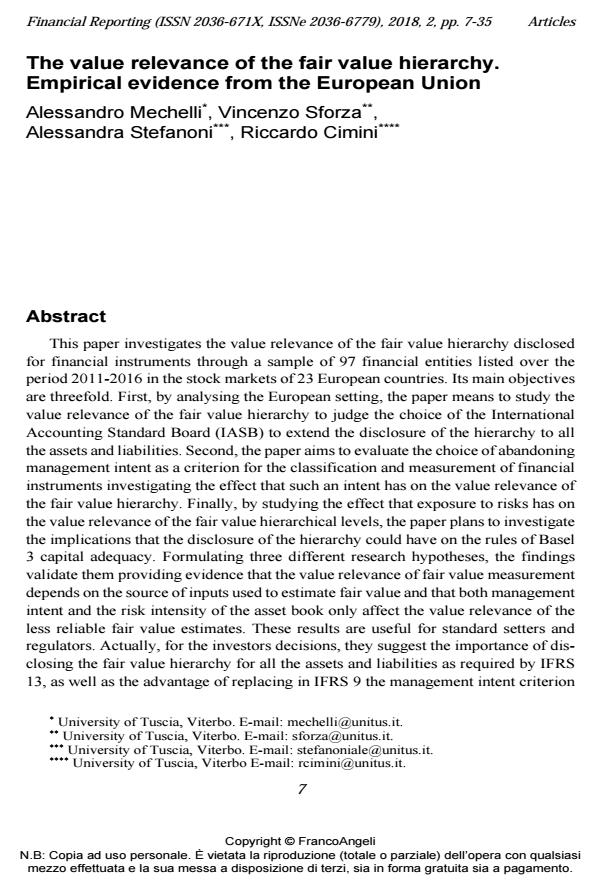The value relevance of the fair value hierarchy. Empirical evidence from the European Union
Titolo Rivista FINANCIAL REPORTING
Autori/Curatori Alessandro Mechelli, Vincenzo Sforza, Alessandra Stefanoni, Riccardo Cimini
Anno di pubblicazione 2018 Fascicolo 2018/2
Lingua Inglese Numero pagine 29 P. 7-35 Dimensione file 539 KB
DOI 10.3280/FR2018-002002
Il DOI è il codice a barre della proprietà intellettuale: per saperne di più
clicca qui
Qui sotto puoi vedere in anteprima la prima pagina di questo articolo.
Se questo articolo ti interessa, lo puoi acquistare (e scaricare in formato pdf) seguendo le facili indicazioni per acquistare il download credit. Acquista Download Credits per scaricare questo Articolo in formato PDF

FrancoAngeli è membro della Publishers International Linking Association, Inc (PILA), associazione indipendente e non profit per facilitare (attraverso i servizi tecnologici implementati da CrossRef.org) l’accesso degli studiosi ai contenuti digitali nelle pubblicazioni professionali e scientifiche.
This paper investigates the value relevance of the fair value hierarchy disclosed for financial instruments through a sample of 97 financial entities listed over the period 2011-2016 in the stock markets of 23 European countries. Its main objectives are threefold. First, by analysing the European setting, the paper means to study the value relevance of the fair value hierarchy to judge the choice of the International Accounting Standard Board (IASB) to extend the disclosure of the hierarchy to all the assets and liabilities. Second, the paper aims to evaluate the choice of abandoning management intent as a criterion for the classification and measurement of financial instruments investigating the effect that such an intent has on the value relevance of the fair value hierarchy. Finally, by studying the effect that exposure to risks has on the value relevance of the fair value hierarchical levels, the paper plans to investigate the implications that the disclosure of the hierarchy could have on the rules of Basel 3 capital adequacy. Formulating three different research hypotheses, the findings validate them providing evidence that the value relevance of fair value measurement depends on the source of inputs used to estimate fair value and that both management intent and the risk intensity of the asset book only affect the value relevance of the less reliable fair value estimates. These results are useful for standard setters and regulators. Actually, for the investors decisions, they suggest the importance of disclosing the fair value hierarchy for all the assets and liabilities as required by IFRS 13, as well as the advantage of replacing in IFRS 9 the management intent criterion with the business model test and the characteristics of the instruments for the classification and measurement of financial assets. For the future, the findings suggest the opportunity to introduce filters within the common equity tier 1 for the less reliable fair value estimates. This paper’s current and future implications for standard setters and regulators are to avoid earnings management and capital management behaviour possibly affecting the quality of financial reporting.
Parole chiave:Value relevance, fair value hierarchy, IFRS 13, financial entities
Jel codes:M41
- Non-Fungible Token valuation: State of the art and future insight Paola Paoloni, Giuseppe Modaffari, Martina Manzo, in FINANCIAL REPORTING 2/2023 pp.39
DOI: 10.3280/FR2023-002002
Alessandro Mechelli, Vincenzo Sforza, Alessandra Stefanoni, Riccardo Cimini, The value relevance of the fair value hierarchy. Empirical evidence from the European Union in "FINANCIAL REPORTING" 2/2018, pp 7-35, DOI: 10.3280/FR2018-002002